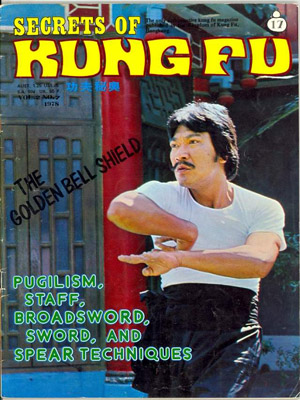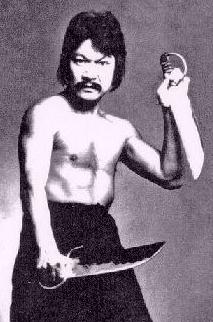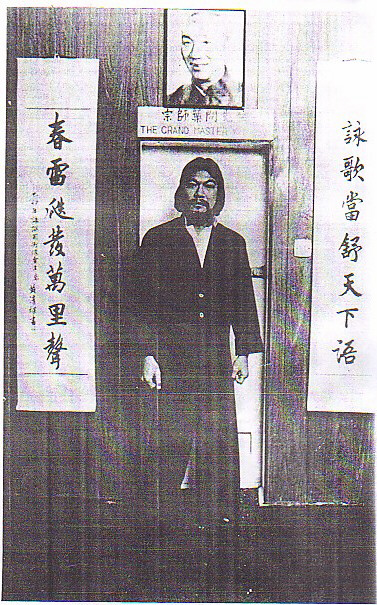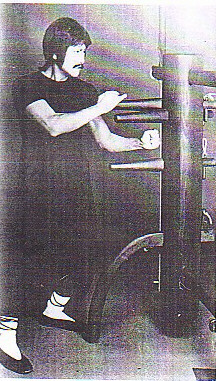Secrets of Kung Fu


The honour of the Yung-ch'un Style ( 詠 春 ) is not in the least vitiated by the unforunate appearance of a few black sheep in its ranks who shamelessly crow about themselves and arouse people with wild talks to seek undeserved fame by deceptive means. The main current are men of talent in the Yung-ch'un ranks, who have profound ahievement in kung fu and are hard working rather than vaunting. In London, England, is a Yung-ch'un instructor of real worth. He is a husky man over six feel tall. Though fierce-looking like Chang Fei ( 張 飛 ) a general of the Three Kingdoms period (222-265 AD) well-known for his fierceness, the Yng-ch'un exponent is actually modest, unassuming and cordial. Nevertheless, he is also esteemed by knowing persons for the irreconcilable stand he takes against vices. His history with the Yung-ch'un Style is a very long one. In fact he was the man who, in the capacity of a substitute of Grandmaster Yeh Wen ( 葉 問 ), taught Bruce Lee the first section of the Little Idea Form on the very day Brue Lee knelt to Grandmaster Yeh Wen to become a Yung-ch'un disciple. The exponent is none other than Victor Kan ( 簡 華 捷 ), a disciple of Grandmaster Yeh Wen of the Yung-ch'un Style. Sifu Victor Kan was born to a family of scholars. His father is the 80-year old historian, Mr. Kan Yu-wen. Since he was a little boy, Victor was taught by his father the moral heritage of the family. He reveres the elders and respects his teachers, in accordance with the doctrine of modesty treasured by the Chinese. He was therefore favoured by Grandmaster Yeh Wen. More than twenty years ago, Chang, his school friend who is now teaching, brought him to a district restaurant workers' union, where he knelt to Grandmaster Yeh Wen to learn Kung Fu. He was only 14 years old then, but he was tall and strong by nature, and was indefatigable after training assiduously all day long. He never tried to learn too
much in a haste, rather, he trained in an orderly way and in a down-to-earth manner. Grandmaster Yeh Wen liked him very much and gave him much personal guidance in after-class times. Sifu Kan was also observant of seniority and was reverent toward his elder fellow disciples. So his elder fellow disciples all looked upon him as their younger brother and gave him much encouragement in a hope that he would achieve his learning as soon as possible. In several years, his skills advanced at miraculous speed.
When he grew up, he studied in Britain, France and Switzerland. His academic achievements helped him in the understanding and analysis of pugilism. All these allowed him to have a deeper understanding of martial arts, not compared by those who confined their training to exercises behind closed doors and thought they were unrivalled when all that they saw was only in a narrow circle. Sifu Kan never forgets his origin. Every summer and winter, he flies thousands of miles to join his fellow disciples in Hong Kong and salute the Grandmaster when the latter was alive. How can a man with his virtue fail in training?
In earlier years, Mr. Kan graduated from Switzerland and held a senior position with a super-hotel in Hongkong. But, being fond of martial arts by nature, he made up his mind to give up his career in business and dedicate himself to


martial arts several years ago. He opened his gym in England to add glory to the Chinese martial arts in that far-away land. He has trained many Chinese and foreign disciples by now. The rules in his gym are very strict. All the pupils must kneel to the portrait of late Grandmaster Yeh Wen each time they enter or leave the gym. A pupil showing the slightest disrespect could be expelled. Therefore his disciples all show respect for their teacher and the doctrine of the style. That the foreigners are so obedient to him is an unmistakable evidence of his true mastery of martial arts. It is also a glory to the Chinese. Though I am his elder fellow disciple, I admire with all my heart his deed of glorifying Chinese martial arts and making the foreigners have a correct understanding of this heritage of the Chinese nation. We can look forward to some day when Chinese martial arts will be as popular in foreign countries as in the land of its origin. When I write this article, I do not expect any pay for an author, nor have I received any gift from Mr. Kan. Only I do not want to see a man of true talent left unknown by the people. Any man of true worth should be presented to the society so that people who are to learn the Yung-Ch'un style will not kneel to a wrong teacher. It should be a good news to foreigners who wish to learn the Yung-ch'un Style.